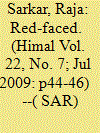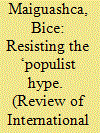| Srl | Item |
| 1 |
ID:
177575


|
|
|
|
|
| Summary/Abstract |
The Boycott, Divestment and Sanctions (BDS) movement, a Palestinian-led anti-Israel international campaign, seems necessary to many ‘progressive’ activists, especially from the radical left. However, it promotes antisemitism through boycotting; legitimisation of terrorism through whitewashing; the destruction of Israel via support for the Palestinian ‘right of return’; and acceptance of antisemitic anti-Zionism by associating Jews, all Jews, with Israel.
|
|
|
|
|
|
|
|
|
|
|
|
|
|
|
|
| 2 |
ID:
089774


|
|
|
|
|
| Publication |
2009.
|
| Summary/Abstract |
In the last three years, Bengal has had two elections-the State Assembly Elections in 2006 and the recently concluded elections to the national Parliament. In the former 294 seats were up for grabs; in the latter, 42. This time aroun, Chief Minister Buddhadeb Bhattacharjee, the poster boy for India's Marxists, seemed to have lost the support of the proletariat and the middle class once and for all.
|
|
|
|
|
|
|
|
|
|
|
|
|
|
|
|
| 3 |
ID:
168875


|
|
|
|
|
| Summary/Abstract |
The purpose of this article is to offer a feminist critique of populism, not as a distinct mode of politics, but as an analytical and political concept. As such, it seeks to redirect our attention away from populism, understood as a politics ‘out there’, towards the academic theoretical debates that have given this analytical term a new lease of life and propelled it beyond academic circles into the wider public discourse. In this context, the article develops two broad arguments. The first is that the two prevailing conceptions of populism are marred by anaemic conceptions of power, collective agency and subjectivity and, as such, are unable to present us with a convincing account of why this form of radical politics emerges in the first place, who its protagonists are, and how they come together in collective struggle. The second is that our current frenetic deployment of the term as a blanket descriptor for radical politics of all persuasions does not bode well for feminism politically. For both reasons, I conclude that feminists need to resist the current ‘populist hype’.
|
|
|
|
|
|
|
|
|
|
|
|
|
|
|
|